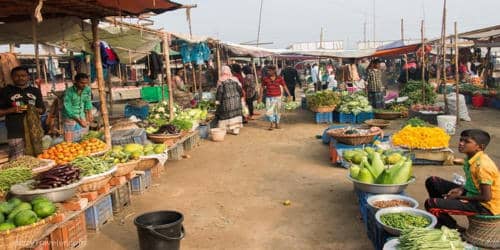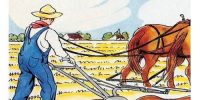A village market is a place where the villagers assemble from around to buy and sell commodities necessary for everyday life. It is a place where the villagers sell and buy the necessary goods for their daily use. It is situated by the side of a river or a canal or under a banyan tree or by the side of a road. It is the backbone of the rural economy. It is a place of great noise and bustle during market hours. A village market is of two types- one is held daily at fore-noon or in the morning and another is held in the afternoon once or twice a week. Crowds of people gather in the market for making sales and purchases.
A village market is generally held in an open place by the side of a river or a canal or a road. It is divided broadly into three parts. A market which is held daily is called a bazaar but the market which is held once or twice a week is popularly known as “hut”. In the bazaar or daily market people usually sell and buy goods of daily needs such as fish, milk, vegetables, meat, betel leaf, etc. But in the hat which is held once or twice a week, the villagers can buy some goods which are necessary but available at every time. People buy cloth, sugar, molasses, sweetmeats, tea, rice, flour, spices, pulses, oil, salt, etc. from the hurt.
A village market is divided into three parts. They are an open-space market, temporary sheds, and permanent sheds. In the open space market, the villagers can buy vegetables, milk, fish, etc. The fish market is the most crowded place in this part of the market. In the temporary sheds, some shopkeepers sit to sell onions, garlic, gingers. Grocers also sit in these sheds. They deal in oil, salt, cloves, pepper, pen, paper, copybooks, etc. Permanent sheds consist of permanent shops or stalls which are arranged in rows. A village market is a meeting place for the villagers. The tea-shops play a great role in this respect.
The village market is very useful to the villages. Here they get all things of daily use. It saves the villages from going to distant places to buy things. It is the meeting place of the villages. The villages find a social and friendly life here. The shopkeepers here sell rice, wheat, pulse, sugar, gur, ghee, butter, spices, cloth, toys, and other useful things. Fish, milk, eggs, poultry, vegetables are generally cheaper in a village market because these are produced locally. Clothes, shoes, toys, suitcases, and other fancy goods are a little bit costly because they are brought from towns paying charges of conveyance. A village market has some disadvantages too. It is a noisy and unhealthy place. The pickpockets gather there.
The village market is not so neat and clean. But it fulfills the need for daily use for the village people. It is also a meeting place for the villagers. The village market does great service to the rural people. When they gather in the village market, they exchange views and discuss many social issues. So a village market is an important place for the villagers. It is the backbone of the rural economy.















